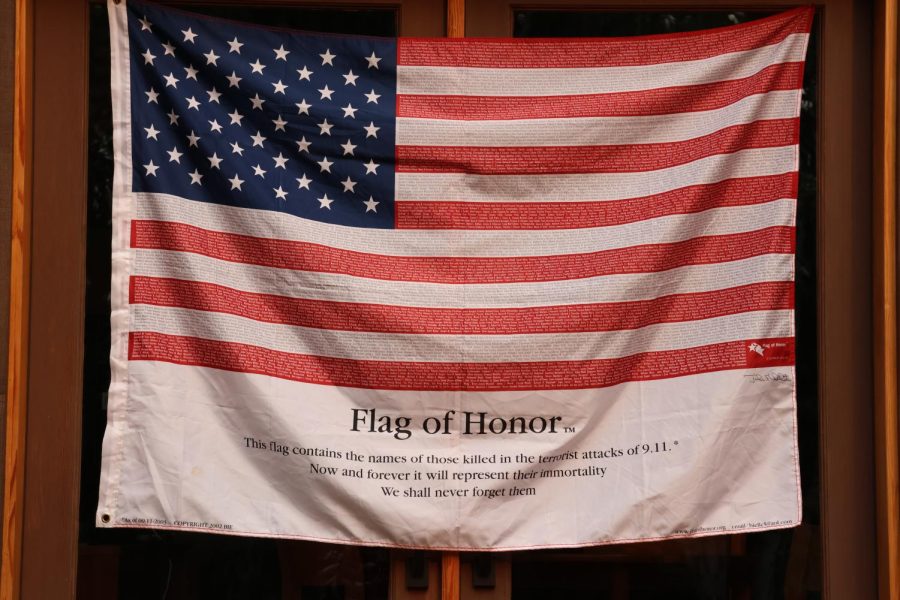On Its 21st Anniversary, Three La Salle Teachers Reflect on 9/11
While 9/11 may have been 21 years ago, memories of one of America’s darkest days still linger in the minds of millions.
September 14, 2022
September 11, 2001 is one of the most infamous days in American history. The attack that shocked the nation saw its 21st anniversary come and go on Sunday. Three La Salle teachers sat down with The Falconer to share their experiences and reflect on that fateful day.
Mr. Gregory Larson, English Teacher: I was living in Oregon City. I was in the sixth grade, and 9/11 happens to be my birthday.
Mr. Alex Lanaghan, Social Studies Teacher: I was a junior at the University of Dayton, and I was almost 21.
Ms. Cha Asokan, Art Teacher: I grew up in New York and New Jersey, but I was living in Austin, Texas at the time. I was teaching elementary art. I was probably the only one in my family that didn’t live in New York.
A day that started as any other day was brought to a screeching halt by the events in New York at around nine in the morning Eastern time.
Lanaghan: It was very much just a typical day in college. I remember that I had racquetball class, of all things.
Cha: That day, I was teaching, and I had a room full of kindergarteners. I get this knock on my classroom door, and one of the attendance clerks said, “New York City’s been bombed.” Immediately, I went into a kind of panic. At that point, the second tower hadn’t been hit.
Lanaghan: Ohio is on East Coast time, so we were experiencing it all live. I was getting ready to go to class and then we saw the first plane hit. I remember being very confused. Really, the thought of terrorism was not the first thought. I remember at my house, we were just saying, “Wow that’s really crazy. We can’t believe that plane just crashed into the tower.” I actually went to my racquetball class.
Larson: My family is not a family that watches the news or reads the newspaper. I didn’t know about what was happening in New York. So I did what many of my classmates did and purchased donuts and cupcakes to bring to my classmates to celebrate my birthday. I showed up at school and learned that there was a national tragedy.
Cha: Immediately, I started calling [my family] and my friends in New York and every line on the phone just gave you, “The number you have reached is not working or in working order.”
Larson: I was just playing basketball in the morning, and we chatted about it as 12-year-olds would. Then, we went into the classroom. Very different tone. The TV was on, and I watched the second plane hit the tower in real-time.
Cha: [The clerk] mentioned that there was going to be a TV put into a room where we could go see the news. I had a five-minute break between my next first graders coming in, so I ran to that room. When I ran to the room, I saw the second plane hit.
Lanaghan: I went to class, and then someone came in and said, “Another plane just hit.”
Cha: My brother said that he felt [the impact]. I had friends who were walking across the Brooklyn Bridge covered in dust because everybody had to just leave.
Lanaghan: I grew up in Chicago, and I had family members and friends who were in downtown Chicago. I remember talking to my brother and my dad, who worked in a high-rise, and their buildings got evacuated because people didn’t know what was going to happen next.
Larson: I don’t think we were ready for that because we were all 11 or 12, so we were really looking to the adults in the room.
Lanaghan: It was just so unheard of that this would have been an act of terrorism.
Cha: You know when you drive into downtown Portland and you see the Portland sign, or you see Big Pink? Those are burned into our childhood memories of where we live. Well, the towers are like that to Manhattan. It was unthinkable that that happened.
Larson: A lot of parents called and said, “I’m coming to get my child,” and it became clear that we couldn’t have class – most of the class was going to be gone. It was a weird day.
Lanaghan: We got an announcement that classes were canceled for the rest of the day. [The university] said, “The chapel’s open, and we’re going to have a special prayer service.”
Cha: [Classes] continued, and we got through the day. We were told not to mention anything to the kids. Obviously, the parents would talk to them.
Lanaghan: We had a prayer service-type vigil, and then school went back to normal the next day.
Cha: Probably one of the scariest days of my life.
The ramifications of 9/11 were felt across the nation for weeks afterward.
Larson: I remember one big change was that people that didn’t watch the news were watching the news. My family went from never watching the news to watching the news every night.
Cha: Everybody was in shock. The United States had never been through something like this before.
Lanaghan: I think the [fear] of going into high-rises, going into large tourist places, I think that definitely lingered for a while.
Cha: I had this little boy who was very intuitive. And his mom came up to me and said, “Jonathan was praying for you and your family,” even though I hadn’t said anything. It was just amazing to see how sweet the kids were being in support of somebody that had connections directly to New York and what was going on there.
Lanaghan: I was a political science and history major, so [9/11] always became part of the conversation.
Larson: My teacher was pretty upset, and somewhat irreverent, and made some pretty offensive jokes. I think that he was really strongly against people of the Islamic religion and people of Middle Eastern descent, and that was not hidden from us. He was very upset, and he made sure, based on the way he talked about things, that we knew that [he thought] people of Middle Eastern descent or people who were Islamic regarding their faith were dangerous. That’s what he was trying to communicate to us.
Cha: It was scary as a person of color because it was found out that al-Qaeda took responsibility for it. While I’m not a Muslim, I can present as one as far as being a person of color and being from India. So I knew that was something that the country was going to struggle with.
Shortly after the events of 9/11, America launched its war on terror and began implementing new policies intended to prevent similar incidents.
Lanaghan: The war started right away. I didn’t know anyone who volunteered, but you kept hearing stories about people of regular walks of life who were leaving their jobs and leaving their careers and volunteering to go serve.
Larson: I remember reading about how things were going to feel different. I remember how going to the airport felt different. You used to be able to go to the gate and just wait for your parent to walk off the plane. And I didn’t have a ton of thought about it because I was so young, but I was right on the precipice.
Lanaghan: It was just flags, patriotism everywhere.
Cha: Everything from TSA to the no-fly list, all of the things that happened with transportation and tightened security just created this feeling of “you need to watch your back all the time.”
Lanaghan: I saw a sign just yesterday – “See Something, Say Something.” That really became the mantra.
The ripple effects of September 11 are still being felt today.
Lanaghan: Immediately, I think about the stereotypes and discrimination of Muslims as paramount to the idea of the legacy of 9/11. You’d hear all these stories about people saying, “Oh, I don’t want to get on a plane if I see a person with a head scarf, or if I see a person that looks like this,” and I think that’s a real tragedy.
Cha: There was such a climate of fear in New York at the time and New Jersey and that whole area that spread to a lot of the country. And I don’t think it’s gone away.
Larson: I think the Patriot Act was a pretty significant game changer regarding how information is collected and processed. I think there were a number of TV shows that spawned about Islamophobia and fear of people from the Middle East. Some of the policies that came out during that time still have a big impact on the world, even if we don’t directly see them connected to 9/11.
Cha: I think the lasting legacy is that the United States would never be the same again, [going] from thinking that we were this untouchable, indestructible nation, to realizing that we were in a bubble that the rest of the world was not. When that happened, the bubble kind of burst and created the reality that a lot of other people had been living their whole lives.
Lanaghan: I studied abroad in January [2002], and that was a real change for me to see how Europeans viewed it because they had been dealing with terrorism for much longer.
Cha: People realized that they really need to not be so isolated and that we are part of the bigger global stage, and we’ve got to take care of each other. I think we took a couple steps backwards on that front, but we’re working on it.
Correction: Sept. 15, 2022
A previous version of this article stated that Mr. Alex Lanaghan was attending Dayton University, when it was in fact the University of Dayton.





